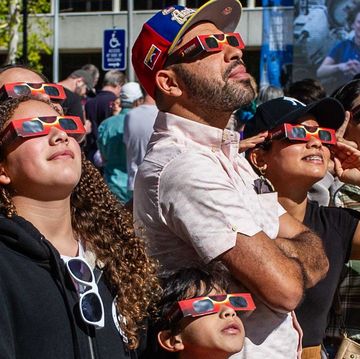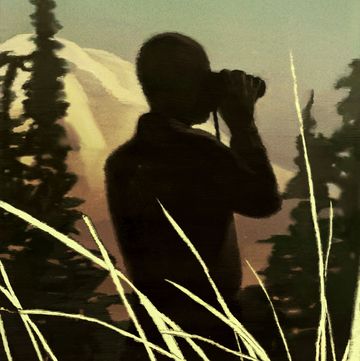Don’t show up to DiscoShow expecting a circus. There are no cascading acrobats and no animals. There aren’t even seats. The immersive dance performance has its Las Vegas audience—up to 500 people per show—on their feet the entire time.
The show is part history lesson, part dance class. At the cavernous Linq Hotel, located across the street from Caesars Palace, floor-to-ceiling screens flash images of 1970s New York City streets and club interiors across the walls. Dancers appear on faux fire escapes and large boxes that the crew wheel in and out. “I Will Survive” by Gloria Gaynor blares. If attendees want more than 70 minutes inside in the 1970s, they can grab a seat next door at the show’s official restaurant, a retro diner and bar that serves a dirty-martini salad (heavy on the olives), “fancy” meat loaf, and disco fries, plus elaborate $20 cocktails with names like LSD and Mind Eraser.
DiscoShow, which opened in fall 2024, is the brainchild of Spiegelworld, a theater company that has managed to capture audiences in Las Vegas with experimental, oddball performances. Of the dozens of live performances happening nightly on the Las Vegas Strip, Spiegelworld stands out as the ultimate multihyphenate: a performance troupe, a restaurant group, and most recently, the owners of a rural town. But no matter how long the list of projects under Spiegelworld’s empire grows, founder Ross Mollison prefers to call his company just a circus.
Spiegelworld was founded in 2005 in New York City by Mollison, an Australian with three decades of experience producing circuses and other live performances around the world, including the Sydney Theatre Company and the Moscow Circus. The name comes from the Dutch word spiegeltent—a large, portable tent with mirrors and stained glass that’s used as an entertainment venue. Spiegelworld’s first show, Absinthe, a variety show hosted by a crass character dubbed the Gazillionaire, featuring acrobatic, dance, and comedy acts, opened in 2006 at Manhattan’s Pier 17 rooftop concert venue. Absinthe was an instant success.
But getting to Las Vegas, the entertainment capital of the world, was always the goal. The show’s plans to open in 2009 at the Fontainebleau in Las Vegas were cut short when the nearly completed hotel was sold in foreclosure. But that didn’t stop Mollison. In 2011, a ramped-up version of Absinthe opened at Caesars Palace. Las Vegas Weekly named it “the Greatest Show in Vegas History.” It’s still running 14 years later. Today, Spiegelworld is made up of more than 700 employees working behind the scenes and performing across its three concurrently running Las Vegas shows: DiscoShow, Absinthe, and Atomic Saloon. Each show has multiple nightly performances; that’s thousands of tickets per week, and hundreds of thousands per year. (Tickets to DiscoShow begin at $69; by contrast, tickets to one of Cirque du Soleil’s five current Vegas shows start at $49.)
“There is an element of chaos about everything we do,” Mollison says. “We take every second of what’s onstage really seriously. We take every dish we prepare really seriously and argue about every cocktail.” The company’s attention to detail is working: Other cities want in. In 2021, Spiegelworld signed a nearly $75 million deal with Caesars Entertainment to bring its oddball ensemble to the Warner Theatre in Atlantic City and develop a new show at Caesars New Orleans.
DiscoShow debuted at the Linq, a moderately priced hotel at the center of the Strip known for its giant Ferris wheel. Mollison has always been a disco lover: A fan of the Bee Gees, he worked with the band’s manager, Robert Stigwood, who produced the film and stage musical Saturday Night Fever. Ringleader of a band of outsiders himself, Mollison was drawn to disco’s underdog history, a genre with underground roots and eventual mass-market appeal. Maybe there was room for a disco circus? In 2013, deep in a research rabbit hole, Mollison came across Åke Blomqvist, a Finnish dance instructor known for his campy dance lessons on Finnish TV. A Blomqvist character, Mollison thought, would have the charisma to engage the audience in an environment more immersive than any other Spiegelworld show. In 2017, Mollison developed a proto-version of DiscoShow. One year later, he began workshopping it in New York City for the Las Vegas debut.
Inside the dark Linq theater, the audience members let down their guard. Between roller skating and dance acts, Blomqvist, played by 39-year-old clown Eli Weinberg, teaches the crowd a simple disco dance routine, layering moves until the crowd can confidently do a few beats of choreography. The audience will be asked to break out these steps over and over. At 7 p.m. on Friday night, I’m surrounded by gaggles of men in resort wear, best-friend duos with good rhythm, and tanned blond women with their less fit husbands. Most appear to be over 50. The constant dancing is a lot to ask of an audience, but to my surprise, everyone appeared more than willing.
As a business, Spiegelworld takes risks. There are no recognizable names to draw in the birthday celebrators, bachelorette parties, or conferencegoers with per diem to burn. Mollison believes people find themselves at a Spiegelworld show when looking to occupy their second night in town. Some, like an offended couple I sat next to at an 8 p.m. Thursday performance of Absinthe, may never return. (The host was on minute four of a joke about a unicorn having a penis for a horn.) But the repeat customers and sold-out shows prove that many more find themselves converted.
Mollison’s unusual vision is clearly working: “Most circuses go bankrupt,” Mollison says, citing the downfall of John Ringling of Ringling Bros. World’s Greatest Show and Cirque du Soleil’s filing for bankruptcy protection during the pandemic. “I ask myself, How do I create something that is more…something that can sustain and become a business for a longer period?”
A solution could be Nipton, California, an 80-acre town with a population of about 15 in the Mojave Desert near the Nevada border where Mollison is experimenting with the future of Spiegelworld. Nipton originated as a gold-mining camp in the early 1900s but was effectively abandoned by the midcentury. In 2017, the town was purchased by American Green, a marijuana company wanting to transform Nipton into a tourist attraction, only to learn that it’s illegal to sell weed in unincorporated areas of San Bernardino. Mollison purchased the town in 2022 for $2.5 million with plans to turn it into “Circus Town USA,” as Spiegelworld calls it—an immersive, overnight adventure for customers and a serene practice space for performers, who can stay on-site. On the weekends, Spiegelworld dancers can travel just an hour southwest from Vegas to avoid the bustle of the city and swim in Nipton’s man-made pond with their families.
Currently, Nipton is not much more than a trailer park with a beautiful pond. But when Mollison talks about Circus Town, it’s as if he can already see the property fully executed. Frank and Alex Strebel, married former Spiegelworld production managers, live and work in Nipton full-time as caretakers. “We always talk about the work that we’re going to do,” Frank says, gesturing toward the humble plot of land, “but to be honest, when you step out of your car here, the place just kind of does it.” Alex believes that a big part of the town’s magic is the silence and the visibility of the Milky Way; it’s the most silent place she’s ever been. The Strebels speak about Nipton’s potential as if it’s already realized—instead of its current state (a pile of stones and dust). They share the same childlike sense of wonder as Mollison, one that might read as delusion to anyone who hasn’t seen Spiegelworld’s Disney-grade world-building capabilities.
Still, Circus Town USA is a ways away. There’s no date for when the hotel and restaurant will be ready for visitors. The team just finished the least glamorous initial step of removing trash from the property. Now they’re in the early stages of converting existing structures like a decrepit schoolhouse and general store and their 10 Spartan Imperial Mansion trailers—believed to be the largest collection in the world—into lodging.
Weinberg (DiscoShow’s Blomqvist) sees Spiegelworld’s taboo tendencies—be it the raunchy language or near nudity—as a risk comparable to the physical ones the company’s acrobats take. “In the comedian and clown space, we also have an obligation to ourselves to [achieve] a spirit of vulnerability,” he says.
In July 2024, Las Vegas reached a record-high 120 degrees. “There is a survivalist but also deeply celebratory space we get to engage in by performing in the middle of one of the driest, most inhospitable places in the world,” Mollison says. It’s classic circus ethos: freakish outsiders risking it all to entertain the masses.
So where exactly does Spiegelworld want to take its audiences? “Spiegelworld is operating on a 10,000-year plan,” Mollison says. It’s hard to tell if he’s earnest. “What could a circus look like over the course of 10,000 years?” Realistically, though, he says he will start with the first 100.•
Correction: This story was updated to correct the name of the theater in Atlantic City.
Lina Abascal is a writer and filmmaker from Los Angeles. Her work has appeared in the Los Angeles Times, Rolling Stone, WIRED, McSweeney’s, and more. She is the author of Never Be Alone Again: How Bloghouse United the Internet and the Dancefloor (2021). Her first film, the award-winning short documentary Stud Country (2024), traces the little-known history of queer country-western dancing in Los Angeles.














